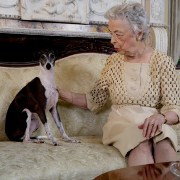 Photo: Getty Images
Photo: Getty Images
Lucy is a miniature Yorkshire Terrier who just received the title of the world's smallest working dog. Weighing in at a really cute two-and-a-half pounds, she is an American dog, living and working in New Jersey.
Her job? She makes a "living" being a therapy dog and works through an organization that provides pet therapy to those in need, called Leashes of Love.
Lucy may be the smallest working dog but she is certainly not alone. Dogs, cats and other animals have long been used to provide comfort, stimulus and other emotional needs to people who are physically challenged, facing depression, illness, old age, or who live alone or in institutionalized care.
The power of pet therapy can't be underestimated. For a millennia, animals have provided very loyal, strong friendships and companionships to humans.
Animals are used in hospitals to provide emotional healing to children and adults who face cancer, Alzheimer's and other conditions that can cause depression, isolation and loneliness.
They assist in the actual healing of many diseases simply through supporting patients emotionally. The stronger a person feels emotionally, the better they can cope with cancer treatments and look toward recovery.
Animals have also been shown to help lower blood pressure for patients and increase the "feel-good" hormones like serotonin that helps to decrease anxiety.
The American Humane Association is working with Pfizer to study the benefits of animal therapy.
The Association stated that "Animal-Assisted Therapy has been shown to help children who have experienced abuse or neglect, patients undergoing chemotherapy or other difficult medical treatments, as well as veterans and their families who are struggling to cope with the effects of wartime military service."
My own work in nursing facilities and working with patients with dementia as well as the developmentally disabled and those isolated or abandoned by their families confirms this. Patients' faces would light up like candles when they interacted with therapy dogs and the effects were long-lasting.
The anticipation of the patients, as well as their knowing that "their" pets were coming to visit at a certain time was enough to get them through a difficult day. The more consistent the visits, the better the benefits.
Calm, relaxed and even-tempered dogs who really enjoy the company of people are not difficult to train. If you have a pet that you think would make a great therapy dog, he or she can become certified although certification is not always necessary.
Both you and your pet would do an enormous service to those in need. You can check into the process by clicking here:
http://www.deltasociety.org/Page.aspx?pid=261/
You can also call nearby hospitals, nursing homes and other care facilities (including juvenile detention centers) to see if you can help. Your pet will need to be assessed by a vet first, and be up to date on any vaccinations required.
SOURCES:
MSNBC. Today Pets and Animals: Mini terrier named world's smallest working dog. Web. January 21, 2012.
http://today.msnbc.msn.com/id/45960529/ns/today-today_pets_and_animals/t...
The American Human Association. Animal Assisted Therapy. Web. January 21, 2012. http://www.americanhumane.org/interaction/programs/animal-assisted-therapy
Reviewed January 23, 2012
by Michele Blacksberg RN
Edited by Jessica Obert




Add a Comment3 Comments
Wrong picture. Here's a video of Lucy.
January 24, 2012 - 6:11amhttp://www.huffingtonpost.com/2012/01/11/tiny-yorkshire-terrier-lucy_n_1199689.html
This Comment
The dog in the picture looks like a greyhound to me. I have three Yorkshire terriers and I guarantee they don't look like that although that is a very handsome dog.
January 23, 2012 - 6:39pmThis Comment
I'm confused, either the picture is not matching the story or the writer got the dog's breed wrong?
January 23, 2012 - 2:09pmThis Comment